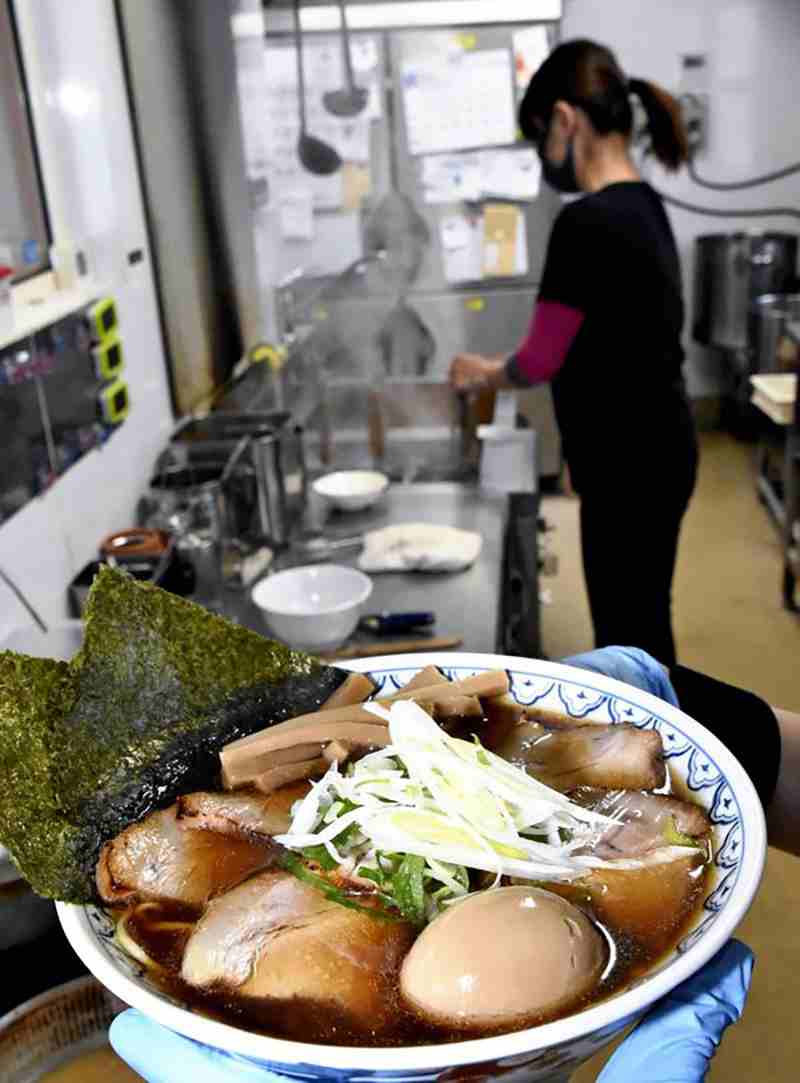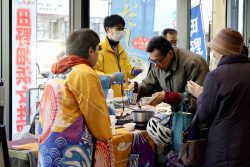
Menya Toromo ramen made with natural dashi broth
14:21 JST, February 1, 2022
AOMORI — A steady stream of female customers heads to the Menya Toromo ramen restaurant in Aomori City at lunchtime, where a sign outside advertises its “natural dashi.”
“The dashi stock has a mild flavor. I can eat this ramen without feeling guilty,” said Mika Nosaka, a company employee from the city.
The soup at Menya Toromo combines 10 kinds of dashi, including those made with dried sardines and kelp, and additive-free soy sauce. It does not use any umami seasoning.
The restaurant adjusts the soup at customers’ requests, for example making it lighter and less salty, and also puts additional dashi on the counter so that people can adjust the flavor themselves.
Female customers appear drawn to Menya Toromo’s health-conscious approach to ramen. Owner and ramen lover Chiaki Kitayama opened the restaurant in December 2016, wanting to make the dish with healthier ingredients.
The restaurant has been well-received, and is crowded with health-conscious female customers and families every day. “[My goal is to] dispel the image that ramen is unhealthy,” Kitayama said.
Restaurants like Menya Toromo have been appearing one after another in Aomori Prefecture, offering such menu items as low-salt and vegetable-packed dishes.
The Aomori municipal government introduced the “health promotion support shop” system in fiscal 2014 to allow residents to choose health-oriented restaurants. Currently, more than 100 restaurants in the city, including Menya Toromo, have been certified under the system.
Many restaurants serve ramen with soup that is richly flavored with niboshi small dried sardines. The custom of eating ramen in the morning has taken root in the prefecture.
People in Aomori Prefecture cannot do without salty food in their everyday life, preferring pickled vegetables, sockeye salmon and salted salmon roe.
“People in this snowy region like to eat richly flavored food, so restaurants are reluctant to serve low-sodium dishes,” said Mariko Imamura, an associate professor of food education and cooking at Shibata Gakuen University in Hirosaki in the prefecture. “They think customers will stay away if they do.”
The average daily salt intake of prefectural residents in fiscal 2016 was 11.3 grams for men, ranked eighth in the nation, and 9.7 grams for women, ranked fourth.
Excessive salt intake could increase the risk of developing cancer, myocardial infarction and stroke.
As part of efforts to change this situation, the prefecture has been promoting the use of dashi instead of salt in an initiative dubbed “dashikatsu,” or dashi activities, since fiscal 2014.
In cooperation with food manufacturers in the prefecture, the prefectural government has developed a low-salt dashi. It has also been working to popularize recipes using dashi to encourage people to reduce the amount of salt they use at home. Since fiscal 2020, the prefectural government has registered the dashikatsu trademark for products such as side dishes with less salt.
Imamura has high hopes for the dashikatsu project, saying, “I hope it will gradually lead to a low-salt diet adapted to modern lifestyles.”
Related Tags
Top Articles in Features
-

Sapporo Snow Festival Opens with 210 Snow and Ice Sculptures at 3 Venues in Hokkaido, Features Huge Dogu
-

Tokyo’s New Record-Breaking Fountain Named ‘Tokyo Aqua Symphony’
-

Tourists Flock to Ice Dome Lodge at Resort in Hokkaido, Japan; Facility Invites Visitors to Sleep on Beds Made of Ice
-

High-Hydration Bread on the Rise, Seeing Increase in Specialty Shops, Recipe Searches
-

Heirs to Kyoto Talent: Craftsman Works to Keep Tradition of ‘Kinran’ Brocade Alive Through Initiatives, New Creations
JN ACCESS RANKING
-

Japan PM Takaichi’s Cabinet Resigns en Masse
-

Japan Institute to Use Domestic Commercial Optical Lattice Clock to Set Japan Standard Time
-

Israeli Ambassador to Japan Speaks about Japan’s Role in the Reconstruction of Gaza
-

Man Infected with Measles Reportedly Dined at Restaurant in Tokyo Station
-

Man Infected with Measles May Have Come in Contact with Many People in Tokyo, Went to Store, Restaurant Around When Symptoms Emerged






















